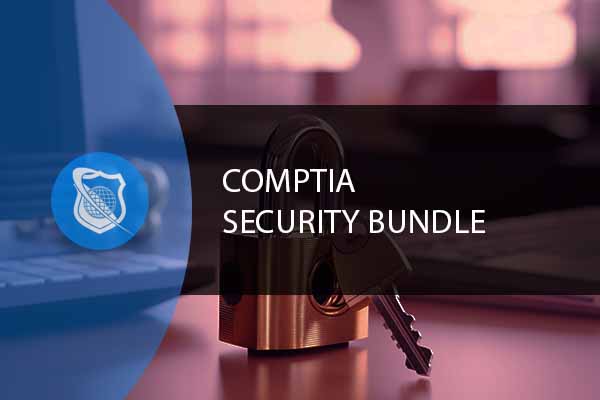CompTIA Security Training Series – 3 Courses
Our CompTIA security training series includes 3 popular CompTIA security related courses. Certified Cloud Security Professional (CCSP), CompTIA CySA+ (Cybersecurity Analyst+) CS0-002, and CompTIA Security+ (SY0-601).
Included In This Course



Closed Captions



Certificate of Completion
Focus on security in this CompTIA security training series
Course Description
Embark on a journey through the world of cybersecurity with our CompTIA Security Training Series, encompassing three essential courses: Certified Cloud Security Professional (CCSP), CompTIA CySA+ (Cybersecurity Analyst+), and CompTIA Security+ (SY0-601). This training program is meticulously crafted to equip you with cutting-edge skills in protecting and securing digital information. Dive deep into the realms of cloud security, network protection, and advanced threat analysis, laying a robust foundation for your cybersecurity career.
Exam Objectives & Certification Insight
Prepare for critical CompTIA certification exams including SY0-601, Security+ SY0-501, and CySA+ (CS0-002). Our expert instructors, possessing extensive experience and high pass rates, will guide you through the core objectives of these exams. This training also covers a comprehensive range of topics such as threat management, risk mitigation, and intrusion detection, vital for achieving CompTIA certifications.
Course Topics Explored
Delve into the intricacies of cybersecurity with modules covering Information Security Roles, Threat and Vulnerability Management, Social Engineering, Cryptography, Network Protocols, and more. Each module is designed to provide practical insights into managing and securing an organization’s digital assets.
Who Will Benefit
- Aspiring cybersecurity professionals
- IT professionals seeking CompTIA certifications
- Network administrators aiming to enhance security skills
- Individuals interested in a career in information security
Course Highlights
- In-depth training on three core CompTIA security courses
- Expert instruction on cloud security, network protection, and threat analysis
- Preparation for SY0-601, Security+ SY0-501, and CySA+ (CS0-002) exams
Job Outlook and Opportunities
The demand for skilled cybersecurity professionals is rising rapidly. With these certifications, you can pursue roles like Security Analyst, Network Administrator, and more in various industries.
Estimated Salary Ranges
The salary range for cybersecurity roles varies by location and experience. In major US cities, the range typically spans from $60,000 to $120,000 annually.
View more information on each of these courses included in our CompTIA Security training by visiting the links below:
- Certified Cloud Security Professional – CCSP
- CompTIA CySA+ (Cybersecurity Analyst+) CS0-002
- CompTIA Security+ (SY0-601)
Frequently Asked Questions About CompTIA Security Training Series
What exams does this course prepare me for?
This course prepares you for the SY0-601 exam, Security+ SY0-501 exam, and the CompTIA CySA+ (CS0-002) exam.
Who are the instructors for this course?
The instructors for this course are Alan Grayson and John. Alan has a 90% average pass rate from those students he has taught and holds several CompTIA certifications. John is a Senior Technical Instructor at Ft. Gordon and has been an IT professional for over two decades.
What topics are covered in the CompTIA Security+ (SY0-601) course?
The course covers a variety of topics, including Information Security Roles Security Control, Threat Actor Types, Organizational Security, Network Reconnaissance, Social Engineering, Cryptography, Certificates and PKI, Authentication, Network Design and Hardware, Network Protocols, Endpoint Security, Mobile Devices, Secure Coding, Privacy and Data Protection, Incident Response, Forensics, Risk Management, and Physical Security among others.
What topics are covered in the CompTIA CySA+ (CS0-002) course?
The course includes modules on Threat and Vulnerability Management, with focus on understanding threat data and intelligence, vulnerability management activities, and implementation of controls to mitigate attacks and software vulnerabilities.
How long is the CompTIA Security+ exam and how many questions does it include?
The CompTIA Security+ exam is 90 minutes long and includes a maximum of 90 questions.
What is the main focus of the CompTIA Security+ certification?
The Security+ certification exam focuses on assessing the baseline cybersecurity skills necessary for IT job roles. It covers the latest trends and techniques in risk management, risk mitigation, threat management, and intrusion detection.
Proudly DisplayYour Achievement
Upon completion of your training, you’ll receive a personalized certificate of completion to help validate to others your new skills.
CompTIA Security+ (SY0-601) Course Content
Module 1: Information Security Roles Security Control and Framework Types
- Introduction and Overview
- Compare and Contrast Information Security Roles
- Compare and Contrast Security Control and Framework Types
- Module Summary
Module 2: Explain Threat Actor Types, Attack Vectors, and Intelligence Sources
- Explain Threat Actor Types and Attack Vectors
- Explain Threat Intelligence Sources
- Module Summary
Module 3: Organizational Security, Network Reconnaissance, General Vulnerability Types, Penetration Testing
- Assess Organizational Security with Network Reconnaissance Tools
- Packet Capture and Replay Demo
- Explain Security Concerns with General Vulnerability Types
- Summarize Vulnerability Scanning Techniques
- Explain Penetration Testing Concepts
- Module Summary
Module 4: Social Engineering, Indicators of Malware Attacks
- Compare and Contrast Social Engineering Techniques
- Analyze Indicators of Malware-based Attacks
- Fork Bomb Malware Demo
- Module Summary
Module 5: Cryptography
- Compare and Contrast Cryptographic Ciphers
- Summarize Cryptographic Modes of Operation
- Summarize Cryptographic Use Cases and Weaknesses
- Summarize Other Cryptographic Technologies
- Module Summary
Module 6: Certificates and PKI
- Implement Certificates and Certificate Authorities
- Implement PKI Management
- Implementing a PKI Demo
- Module Summary
Module 7: Authentication
- Summarize Authentication Design Concepts
- Implement Knowledge-based Authentication
- Password Cracker Demo
- Implement Authentication Technologies
- Summarize Biometrics Authentication Concepts
- Module Summary
Module 8: Identity and Accounts, Authorization, Personnel Polices
- Implement Identity and Account Types
- Implement Account Policies
- Account Types and Polices Demo
- Implement Authorization Solutions
- Explain the Importance of Personnel Policies
- Module Summary
Module 9: Network Design and Hardware (Part 1)
- Implement Secure Network Designs
- Implement Secure Switching and Routing
- Various Types of Network Attacks Demo
- Implement Secure Wireless Infrastructure
- Implement Load Balancers
- Module Summary
Module 10: Network Hardware (Part 2)
- Implement Firewalls and Proxy Servers
- Implement Network Security Monitoring
- Summarize the Use of SIEM
- Module Summary
Module 11: Network Protocols
- Implement Secure Network Operations Protocols
- Implement Secure Application Protocols
- Implement Secure Remote Access Protocols
- Module Summary
Module 12: Endpoint Security
- Implement Secure Firmware
- Implement Endpoint Security
- Endpoint Protection Demo
- Explain Embedded System Security Implications
- Module Summary
Module 13: Mobile Devices
- Implement Mobile Device Management
- Implement Secure Mobile Device Connections
- Module Summary
Module 14: Indicators of Attacks, Intro to Secure Coding, Scripting, Deployment and Automation
- Analyze Indicators of Application Attack
- Analyze Indicators of Web Application Attacks
- Summarize Secure Coding Practices
- Implement Secure Script Environments
- Summarize Deployment and Automation Concepts
- Module Summary
Module 15: Secure Coding, Scripting, Deployment, Cloud and Virtualization
- Summarize Secure Cloud and Virtualization Services
- Apply Cloud Security Solutions
- Summarize Infrastructure as Code Concepts
- Module Summary
Module 16: Privacy and Data Protection
- Explain Privacy and Data Sensitivity Concepts
- Explain Privacy and Data Protection Controls
- Module Summary
Module 17: Incident Response
- Summarize Incident Response Procedures
- Utilize Appropriate Data Sources for Incident Response
- Apply Mitigation Controls
- Module Summary
Module 18: Forensics
- Explain Key Aspects of Digital Forensics Documentation
- Explain Key Aspects of Digital Forensics Evidence Acquisition
- Module Summary
Module 19: Risk Management and Business Impact Analysis
- Explain Risk Management Processes and Concepts
- Explain Business Impact Analysis Concepts
- Module Summary
Module 20: Redundancy and Backup Strategies
- Implement Redundancy Strategies
- Implement Backup Strategies
- Implement Cybersecurity Resiliency Strategies
- Module Summary
Module 21: Physical Security
- Explain the Importance of Physical Site Controls
- Explain the Importance of Physical Host Security Controls
- Module Summary
Module 22: Afterword
- Conclusion and General Exam Tips
CompTIA CySA+ (Cybersecurity Analyst+) CS0-002 Course Content
Module 1: Threat and Vulnerability Management
- Instructor Intro
- About the Exam
- Test Taking Tips and Techniques
- Explain the importance of threat data and intelligence
- Given a scenario, utilize threat intelligence to support organizational security
- Given a scenario, perform vulnerability management activities Pt 1
- Given a scenario, perform vulnerability management activities Pt 2
- Given a scenario, analyze the output from common vulnerability assessment tools
- Explain the threats and vulnerabilities associated with specialized technology
- Explain the threats and vulnerabilities associated with operating in the Cloud
- Given a scenario, implement controls to mitigate attacks and software vulnerabilities Pt 1
- Given a scenario, implement controls to mitigate attacks and software vulnerabilities Pt 2
Module 2: Software and Systems Security
- Given a scenario, apply security solutions for infrastructure management Pt 1
- Outline
- Given a scenario, apply security solutions for infrastructure management Pt 2
- Given a scenario, apply security solutions for infrastructure management Pt 3
- Flashcards
- Explain software assurance best practices
- Scatter
- Explain hardware assurance best practices
- Learn
- Speller
- Workbook
Module 3: Security Operations and Monitoring
- Given a scenario, analyze data as part of security monitoring activities Pt 1
- Given a scenario, analyze data as part of security monitoring activities Pt 2
- Given a scenario, analyze data as part of security monitoring activities Pt 3
- Given a scenario, implement configuration changes to existing controls to improve security Pt 1
- Given a scenario, implement configuration changes to existing controls to improve security Pt 2
- Explain the importance of proactive threat hunting
- Compare and contrast automation concepts and technologies
Module 4: Incident Response
- Explain the importance of the incident response process
- Given a scenario, apply the appropriate the incident response procedure
- Given an incident, analyze potential indicators of compromise
- Given a scenario, utilize basic digital forensic techniques
Module 5: Compliance and Assessment
- Understand the importance of data privacy and protection
- Given a scenario, apply security concepts in support of organizational risk mitigation Pt 1
- Given a scenario, apply security concepts in support of organizational risk mitigation Pt 2
- Explain the importance of frameworks, policies, procedures, and controls Pt 1
- Explain the importance of frameworks, policies, procedures, and controls Pt 2
Module 6: Afterword
- Recap
- Review Questions
- Before the Exam
Certified Cloud Security Professional - CCSP Course Content
Cloud Concepts, Architecture and Design
- Course Intro
- Cloud Concepts, Architecture and Design - Part 1
- Cloud Concepts, Architecture and Design - Part 2
- Cloud Concepts, Architecture and Design - Part 3
- Cloud Concepts, Architecture and Design - Part 4
- Cloud Concepts, Architecture and Design - Part 5
- Cloud Concepts, Architecture and Design - Part 6
- Cloud Concepts, Architecture and Design - Part 7
- Cloud Concepts, Architecture and Design - Part 8
- Cloud Concepts, Architecture and Design - Part 9
Legal, Risk and Compliance
- Legal, Risk and Compliance Part 1
- Legal, Risk and Compliance Part 2
- Legal, Risk and Compliance Part 3
- Legal, Risk and Compliance Part 4
- Legal, Risk and Compliance Part 5
- Legal, Risk and Compliance Part 6
- Legal, Risk and Compliance Part 7
Cloud Data Security
- Cloud Data Security - Part 1
- Cloud Data Security - Part 2
- Cloud Data Security - Part 3
- Cloud Data Security - Part 4
- Cloud Data Security - Part 5
- Cloud Data Security - Part 6
- Cloud Data Security - Part 7
Cloud Platform and Infrastructure Security
- Cloud Platform and Infrastructure Security - Part 1
- Cloud Platform and Infrastructure Security - Part 2
- Cloud Platform and Infrastructure Security - Part 3
- Cloud Platform and Infrastructure Security - Part 4
- Cloud Platform and Infrastructure Security - Part 5
- Cloud Platform and Infrastructure Security - Part 6
- Cloud Platform and Infrastructure Security - Part 7
- Cloud Platform and Infrastructure Security - Part 8
Cloud Application Security
- Cloud Application Security - Part 1
- Cloud Application Security - Part 2
- Cloud Application Security - Part 3
- Cloud Application Security - Part 4
- Cloud Application Security - Part 5
- Cloud Application Security - Part 6
- Cloud Application Security - Part 7
- Cloud Application Security - Part 8
- Cloud Application Security - Part 9
Cloud Security Operations
- Cloud Security Operations - Part 1
- Cloud Security Operations - Part 2
- Cloud Security Operations - Part 3
- Cloud Security Operations - Part 4
- Cloud Security Operations - Part 5
- Cloud Security Operations - Part 6
- Cloud Security Operations - Part 7
- Cloud Security Operations - Part 8
- Cloud Security Operations - Part 9
- Cloud Security Operations - Part 10
- Cloud Security Operations - Part 11
- Course Outro
Your Training Instructors
Alan Grayson has been teaching bootcamps for 20 years and has a 905 average pass rate from those students he has taught. Alan has attended The USAF Academy, University of Southern California, and has certifications in CompTIA CTT+, CASP+, CySA+, PenTest+, Security+, Network+, A+ as well as Cloud+. Alan also holds the CISSP Certification and is an official ISC2 Instructor for CISSP, SSCP, CSSLP, and CCSP.
John is a Senior Technical Instructor at Ft. Gordon in Augusta, Georgia, instructing U.S. military and civilian employees on a number of cybersecurity subjects and certifications. He has been an IT professional for well over two decades, as prior to his current job he retired from the Army after a 20-year career as a soldier in the signal branch (IT and communications). John holds a bachelor’s degree in Computer Science from the University of Maryland Global Campus as well as the following IT certifications: Network+, Security+, Cybersecurity Analyst (CySA+), CompTIA Advanced Security Practitioner (CASP+), Certified Information Systems Security Professional (CISSP).

Subscribe To All-Access
Lock In $16.99 / Month Forever
Access this course and over 2,700 hours of focused IT training. Start your first month for only $1.00. Then lock in only $16.99 / month for life.
- Get Every Course
- Free Updates / New Content Added
- 2,700+ Hours of Training
- Price Lock Guarantee
- Games / Flashcards
- 21,000+ Practice Questions
$49.99 $16.99 Monthly
$59.00







good
Smooth delivery and easy access to LMS. Good to see that the LMS offers progress tracking. Would be great if badges were offered on completion of courses to share via Credly to future employers.